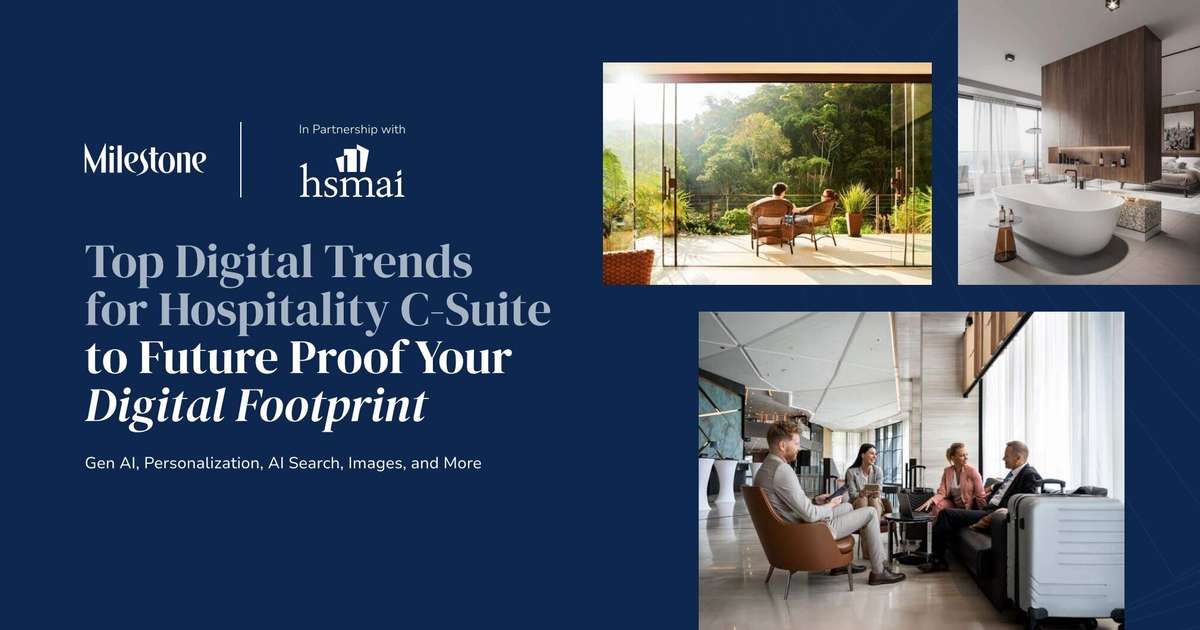
Independent hotels have a competitive edge in their DNA – offering rare, remarkable experiences that guests want to talk about, post about, and relive. According to Expedia Group’s Unpack ’24 report, more than 90% of travelers say the vibe of a hotel is important when booking. Additionally, 67% of travelers would pay more to stay at a hotel that aligns with their preferred vibe, highlighting the significance of personalized and unique experiences in the hospitality industry.
While the unique vibe sets independent hotels apart, success in today’s digital marketplace depends on how effortlessly guests can discover and book that experience online. As consumers grow increasingly tech-savvy, how can independent hotels put their best foot forward in the digital marketplace? This article goes back to basics in terms of online usability, and highlights practical tools and strategies to bring eCommerce to hotel websites and drive more direct bookings.
Hotel eCommerce starts with usability
Danish usability pioneer Jakob Nielsen once said: The first rule of eCommerce is that if you cannot find the product, you cannot buy it either.
Back in 1994, he developed his renowned 10 Usability Heuristics for User Interface Design, which are still highly relevant for websites across all industries, including hospitality. In fact, a recent study by Forrester shows that websites with all usability principals applied have up to 400% higher conversion rates than those that don’t.
Today’s guests are increasingly tech-savvy, digital natives who expect a fast and seamless transition from browsing to booking. Adding another layer of complexity for hotels is that the digital world is overflowing with glitzy website design agencies and shiny tech solutions which can make it difficult to know what works best for your brand, your website, and, most importantly, your guests!
Hotels with a strong brand and story already have a powerful advantage in the online marketplace. The next step is usability, and a good exercise to evaluate how user-friendly your hotel website is would be to benchmark it against Nielson’s principles.
Hotel Website Usability Checklist:
- Availability, rates, and booking confirmation are clearly displayed at every step.
- Language and visuals match how guests talk and think—clear, friendly, and intuitive.
- Guests can change dates, room types, or restart a search without losing progress.
- Design, branding, and tone are consistent from homepage to confirmation.
- Inputs and prompts help prevent common errors (e.g., invalid dates or empty fields).
- Key booking info (room details, pricing, dates) stays visible during the journey.
- Navigation is smooth for both new and returning guests, across desktop and mobile.
- Layout is clean and focused, with visuals and calls-to-action that guide, not distract.
- Clear, friendly error messages help guests understand and fix problems easily.
- Support like FAQs or live chat is available during critical booking steps.
Aesthetics alone won’t drive bookings. A beautiful website that lacks clear offers, prominent booking buttons, and compelling calls-to-action is just expensive décor.
5 Practical Ways to Bring Hotel eCommerce to Your Website & Drive Direct Bookings
In hospitality, inspiration sparks interest—but it’s a smooth, intuitive booking journey that turns that interest into revenue. From the moment guests land on your site to the final confirmation screen, every step should feel seamless, relevant, and easy. Here’s how to bring eCommerce best practices to your hotel website to boost direct bookings and reduce drop-offs.
1. Deliver a Seamless Website-to-Booking Experience
Guests feel confident and comfortable when they can explore, select, and book without leaving your site—creating a seamless journey that reflects your unique brand and values. Imagine a guest browsing your photo gallery, captivated by your beachfront suite—and then clicking “Book Now” only to be redirected to a page that looks completely different, with a different URL. That disconnect creates doubt. Instead, ensure that the booking flow feels like a continuation of the website experience—same design, same branding, same domain. This consistency builds trust and keeps guests from bouncing.
Why it matters: 75% of consumers admit to judging a business’s credibility based on its website design (Stanford Web Credibility Research). Any break in that design can break their trust.
2. Let Guests Book While They’re Inspired
Think of a guest exploring your romantic getaway page and seeing the perfect suite for their anniversary. If there’s no easy way to check availability right there and then, they may leave to “come back later”—but often, they don’t. Allow guests to check dates and prices directly from your homepage, gallery, or room descriptions—so they can act when excitement peaks.
Why it matters: 70% of travelers expect to book directly after being inspired, especially on mobile (Google Travel Insights). Make sure the path from inspiration to action is short.
3. Reduce Abandonment with Timely Nudges
Let’s say a guest has selected their dates and room but pauses to compare prices. Before they leave, show a gentle message like “Only 2 rooms left for these dates” or “Your selection is still available—complete your booking and get a free welcome drink.” You can also invite them to leave an email to save their selection or follow up with a tailored offer.
Why it matters: 87% of travelers abandon bookings before completion (SalesCycle). Timely reminders and gentle prompts can recover up to 30% of those lost opportunities.
4. Make the Booking Experience Feel Personal
If a guest visits your site in French from Paris, why force them to navigate in English and see default offers for the U.S. market? Today’s travelers expect digital experiences that adjust to their needs—whether that’s recognizing a returning visitor, displaying content in their language, or highlighting relevant deals based on where they’re browsing from.
Why it matters: 80% of consumers are more likely to purchase from brands that offer personalized experiences (Epsilon). Booking journeys should feel intuitive, not transactional.
5. Meet Guests on their Preferred Device—and Add Value
Picture a group of curious young adventurers planning a summer vacation from their phones, until they find a link to your hotel website on Instagram. If your website loads slowly or doesn’t adapt to their device, you’ve lost them. Ensure your site and booking experience work seamlessly on mobile, are discoverable on travel platforms, and offer simple add-ons—like airport pickup or a family picnic package—that enhance the stay and generate revenue.
Why it matters: 72% of mobile bookings happen within 48 hours of a last-minute search (Sojern). And upsells can increase revenue per booking by 18% on average (Skift).
Success in Hotel eCommerce comes from putting the Guest First
Independent hotels have something no algorithm can replicate: unique experiences that guests crave and want to boast about to their friends or across social networks. But that value only translates into direct bookings when the guest journey is thoughtfully designed from the very first interaction—not just at the check-in desk, but from the moment someone lands on your website.
Prioritizing direct relationships starts long before the booking. It begins the instant a potential guest interacts with your brand online. The tone of your content, the clarity of your offers, and the ease of making a reservation all contribute to whether a guest feels confident booking directly—or decides to look elsewhere.
Hotels that have invested in usability and guest-first design are seeing measurable results: doubling direct bookings and making them the majority contributor to overall revenue. When your website reflects the same care and hospitality guests experience in person, it builds trust, drives conversions, and reinforces brand loyalty from the outset.
If your goal is to build stronger guest relationships and drive direct bookings, your website must work as an extension of your hospitality—clear, helpful, and focused on making every interaction count towards achieving those goals.
About GuestCentric
GuestCentric is a leading provider of cloud-based digital marketing software and services that help extraordinary hoteliers promote their brand, drive direct bookings and connect with customers on all digital platforms. GuestCentric’s all-in-one platform provides hotels with the only unified solution for managing their guests’ online journey: award-winning, high impact websites; an integrated, easy-to-use booking engine; social media marketing and publishing tools; a GDS chain code and a channel manager to offer rooms on Amadeus, Booking.com, Expedia, Galileo, Google, Sabre, TripAdvisor and hundreds of other channels. GuestCentric is a proud provider of solutions that maximize direct bookings to hotel groups and independent hotels from collections such as Design Hotels, Great Hotels of the World, Leading Hotels of the World, Relais & Chateaux, Small Luxury Hotels and Small Danish Hotels. GuestCentric is featured on Skift Travel Tech 250, a list of the top 250 travel tech companies shaping the modern-day travel experience.
Melissa Rodrigues
Content Manager
+35 196 157 3854
GuestCentric Systems
View source


